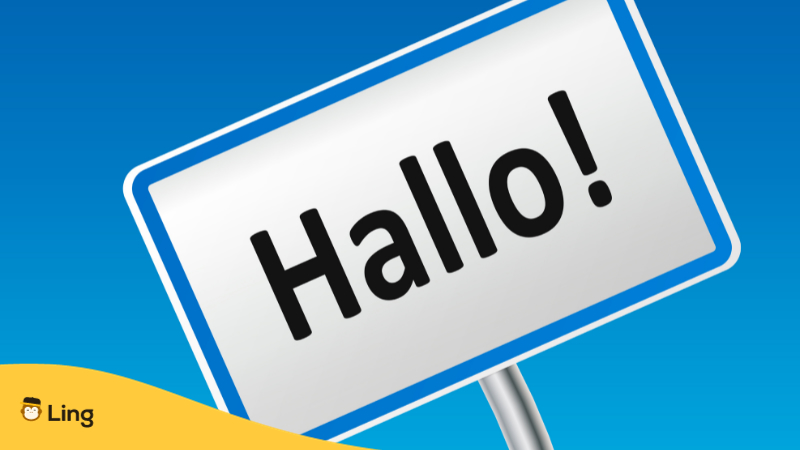Did you know that the German language is one of the most popular languages on Earth? It’s spoken in over 22 countries worldwide but remains the most popular in Europe. Over 155 million people speak German, and they would surely be impressed if you knew any greetings in German!
Greeting people in their native language is always a polite thing to do. It creates an immediate level of respect. Learning German language greetings is sure to come in handy if you plan to travel to Germany, especially if you’re trying to impress business colleagues or any parents of your German partner.
Just like with any culture, there are, of course, right ways and wrong ways to greet people in German. Let’s take a look at the most common German greetings.

Dos And Don’ts: How To Greet People Properly In Germany (And Abroad)
Greetings in German may be quite different from what you’re used to. What is deemed proper etiquette in one culture can be considered to be completely disrespectful. You’ll want to make a great first impression and avoid looking silly or offensive when making German greetings.
For example, it’s normal etiquette to kiss everyone you meet on both cheeks in France. In Arab culture, it’s the norm to hug and kiss both males and females. Is that what’s expected in German culture? Let’s dive into the dos and don’ts of greeting etiquette.
Do You Shake Hands In Germany?
Handshakes – Do
Yes! When meeting someone for the first time, it is customary to greet them with a firm (but not too strong) handshake. You don’t want to give a meek handshake, which could say a lot about your character.
It’s common to shake hands with both men and women and if you want to go that extra mile to impress a woman, you could go for the kiss the back of the hand trick.

Do People Hug In Germany?
Hugs – Don’t
Greetings in German do not often involve hugs. Germans are not overly affectionate with people they’ve just met. It’s best to avoid going in for a hug the first few times you meet and greet someone. Germans tend to reserve hugging for very close friends and family, and even then, hugs are given as more of a half-hug with a pat on the back.
Women are more open to the idea of hugs, but don’t get carried away! Hugs are reserved for people they know well, so don’t overstep your boundaries.
Do People Kiss In Germany?
Kisses – Don’t In Germany, Do In Austria
Kisses on the lips or cheeks as a way to greet someone in Germany is not a common practice at all. Even among close family and friends, it’s a rare occurrence. However, kissing on the cheeks is more culturally accepted in neighboring Austria but still reserved for close family and friends. Don’t greet a stranger by kissing them!
Should You Make Eye Contact With Germans?
Making Eye Contact – Do
Yes! Greetings in German should all involve eye contact. When greeting a German person, it’s polite and expected that you would look them in the eyes. Not a hard stare or anything. Just a polite look and a nod will do. Along with confident body language, eye contact shows confidence and friendliness.
Formal And Informal Greetings In German
In a German-speaking country, the general rule of thumb is that formal is better. You can’t go wrong with being formal, and people will appreciate the level of respect! We’ll go over different greetings in German, such as how to say hello, say goodbye, ask people how they are, and respond to such inquiries in formal situations or informal situations.
You’ll want to use formal German greetings in a formal setting. You can opt for casual greetings in an informal situation, especially among friends.

How To Say ‘Hello’ In German
Saying ‘hello’ in German can be achieved in many different ways. The German language offers lots of fun ways to say hello!
Hello In Formal German
Informal German
How to Ask ‘How Are You?’ In German
A part of most cultures is checking in on the person you have met with a simple inquiry; ‘How are you?’ Like in the English language, the Germans’ have many ways to ask that question.
How Are You In Formal German
| English Translation | German Phrase | Sound |
|---|---|---|
| How are you? | Wie geht es ihnen? | |
| Are you doing fine? | Geht es gut? | |
| Hi, how are you? | Hallo, wie geht es ihr? | |
| Fine, thanks, how are you? | Gut, danke, und ihnen? |
How Are You In Informal German
| English Translation | German Phrase | Sound |
|---|---|---|
| How’s it going? | Wie geht’s? | |
| Is everything OK? | Ist alles OK? | |
| How’s it going? | Wie geht es dir? | |
| Everything alright? | Alles gut? |

How to Say ‘Goodbye’ In German
Equally as saying hello, is knowing how to say goodbye in German! It can be rude not to say goodbye, and there are many forms to do so.
How To Say Goodbye In Formal German
| English Translation | German Phrase | Sound |
|---|---|---|
| Goodbye | Auf Wiedersehen | |
| Have a nice day | Schönen Tag | |
| Have a nice weekend! | Schönes Wochenende! | |
| See you again | Auf Wiedersehen | |
| Have a nice evening | Abend noch |
Informal German

How To Respond To German Greetings
It’s important to know what to say when someone asks you how you are or says hello. You can use various sayings to respond to people on the street, people you’ve just met, or your friends.
Formal German Greetings
General Responses For Greetings In German
Learn More Than Just Greetings In German With The Ling App
With all this new useful knowledge, you’re ready to head out and use these German greetings! It can be tough learning a foreign language, and we hope this article has made learning greetings, such as saying hello in German, much clearer.
Are you ready to dive in and learn German? The Ling app is a great language acquisition tool that you can carry around in your pocket. With just 5 to 15 minutes a day, Ling will help you learn the ins and outs of German. Go on! Try it out and be prepared for your travels, or be ready for a conversation with a friend or neighbor.
Don’t have time to attend German lessons online or physically? Then the Ling app is the best language learning app to use now. Download it on the Play Store or App Store.
Auf bald! See you soon!



































































